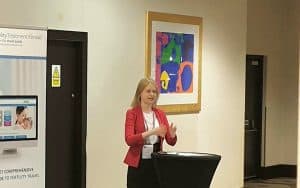23 May 2025
DNA testing firm 23andMe avoids bankruptcy with an announcement on 19 May 2025 that it will be bought by US biotechnology company Regeneron Pharmaceuticals for $256 million (approximately £192 million). Regeneron Pharmaceuticals plans to operate 23andMe and continue all consumer genome services as a wholly-owned company subsidiary. This follows news reports on 23 March 2025 that 23andMe had petitioned for bankruptcy following financial difficulties and data privacy concerns after a cyber hack in 2023 which affected personal data of 7 million users. However, this continues to raise questions for 15 million users worldwide about what will happen to their genetic information?
What will happen to my personal genetic data?
Customers purchased 23andMe’s DNA testing kits and sent in their personal genetic samples wanting to learn more about their personal ancestry, identify and trace genetic relatives, build family trees and obtain personal insights about their health and wellbeing. However, their personal genetic samples and data has now been sold to a large US company called Regeneron Pharmaceuticals for large-scale genetic research and development of drugs and therapies. Regeneron issued a press release saying:
“We have deep experience with large-scale data management, having worked with collaborators around the world to link deidentified DNA sequences from nearly three million consented participants to electronic health records, safely and securely enabling future medical advances. We believe we can help 23andMe deliver and build upon its mission to help those interested in learning about their own DNA and how to improve their personal health, while furthering Regeneron’s efforts to use large-scale genetics research to improve the way society treats and prevents illness overall.”
Regeneron Pharmaceutical’s press release also stated that it intends to honour 23andMe’s data privacy policies, a key condition of 23andMe’s sale, and deploy its own security controls to protect users’ personal genetic data:
“23andMe is a pioneer in consumer genetics and research, and we are excited for the opportunity to support their important mission and grow their platform and business. As a world leader in human genetics, Regeneron Genetics Center is committed to and has a proven track record of safeguarding the genetic data of people across the globe, and, with their consent, using this data to pursue discoveries that benefit science and society. We assure 23andMe customers that we are committed to protecting the 23andMe dataset with our high standards of data privacy, security and ethical oversight and will advance its full potential to improve human health.”
Regeneron Pharmaceutical’s stated commitment to protecting user’s personal genetic data will offer some reassurance to 23andMe users. However, it does not detract from the fact that 23andMe’s biobank and genetic data sets are hugely valuable and that these will now be used for profit-driven purposes for genetic research and drug development. It also remains to be seen whether they will, in future, be used for other purposes too such as personalised medicine applications. Added to this, users personal genetic samples and data do not have a shelf-life meaning they could be used for many years to come in all sorts of different ways that we have yet to fully envisage as science, medicine and technology rapidly advances. This makes it even more important to ensure that people’s personal genetic samples and data are properly protected with appropriate controls around privacy, choice and consent.
You can read more in our previous blog dated 31 March 2025 “Genetic Testing Firm 23andMe Files For Bankruptcy: What Does This Mean For Me?”.
Direct-to-Consumer DNA Testing: Family and Fertility Law
23andMe’s continued operation and delivery of direct-to-consumer DNA tests following its sale to Regeneron Pharmaceuticals also brings into focus wider issues associated with at-home DNA testing. Whilst users can undergo at-home DNA tests with the best of intentions to find out more about their personal genealogy, genetic relatives and health they can also unwittingly become embroiled in all manner of difficult and challenging situations. Direct-to-consumer DNA testing can unexpectedly expose secret love affairs and infidelity, unknown genetic relatives, fertility fraud, serial sperm donation, IVF mix-ups and adoption.
These sorts of unexpected discoveries can cause shock, distress, uncertainty and complex legal issues that impact not just users but their spouses, partners, children, aunts, uncles, cousins and siblings too. In turn, this can lead to paternity disputes, problems with birth certificates, unresolved personal identity and history, undocumented citizenship claims, financial and inheritance issues. As such, direct-to-consumer DNA tests like the ones offered by 23andMe have never been risk free and any resulting legal and practical issues can require expert guidance and management.
Need Advisory, Consultancy, a Fertility or Family Lawyer?
Direct-to-consumer DNA testing can create a range of complex issues that extend far beyond genetic and data privacy and security. These can include issues about an individual’s parentage, family history and relationships, genetic relatives and/or their birth certificate. This can lead to family law issues that require expert management including:
- Connecting with an unknown/absent genetic parent or relative (e.g. following adoption, disconnected family history, donor conception, fertility fraud).
- Clarifying and confirming biological and/or legal parentage (e.g. following assisted conception, adoption, death of parent, lack of parental cooperation, paternity dispute).
- Need to rectify an inaccurate birth certificate (e.g. problems with spelling of names, wrong person recorded as parent).
- Adding a birth parent’s name to birth certificate (e.g. an individual is ‘fatherless’ with no father listed on birth certificate or an original birth certificate prior to adoption).
- An application for a Declaration of Parentage in the English Family Court (e.g. to resolve legal and/or biological parentage for personal identity reasons and/or support citizenship and inheritance claims).
To find out more about an application for a Declaration of Parentage in the English Family court click here.
To read more about genomics, genetics and family law click here.
Do you need advisory, consultancy or expert legal help to navigate DNA testing, legal and biological parentage, an application for a Declaration of Parentage or rectification of a birth certificate? If you would like to discuss your situation or you would like specialist legal advice contact Louisa Ghevaert by email louisa@louisaghevaertassociates.co.uk or by telephone +44 (0)20 7965 8399.



Images: Louisa Ghevaert, CEO & Founder Louisa Ghevaert Associates
To find out more about Louisa Ghevaert click here.




